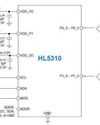
Just as there are invisible spectra of light, there are inaudible sounds. The human eye can't see infrared light at low frequencies and ultraviolet light at high frequencies. For audio, our ears can't detect the high ultrasound frequencies that are useful for things such as television remote controls and medical imaging. Sound also has an inaudible low-frequency component called infrasound.
A few electronic device designs have been published for making ultrasound audible. Most of these use heterodyning to shift the ultrasonic frequencies down to the audible range. The principal purpose of these circuits is to listen to the echolocation calls of bats, which occur at frequencies up to about 200kHz, but more typically between 20kHz and 60kHz. Electronics for such devices are a simple design problem for Circuit Cellar readers, but microphones with sensitivity at ultrasonic frequencies can be quite expensive. The inexpensive ultrasound receivers used in remote controls are not suitable for broadband ultrasonic detection, since they respond to a single frequency, 40kHz, with just a kilohertz bandwidth. If you don't live near a bat cave or highly wooded area, there will be little ultrasound activity.
Winds blowing over uneven terrain, ocean waves crashing onto shorelines, and erupting volcanoes generate infrasound waves that can travel long distances. Heavy vehicles and machinery are other sources of infrasound. Sound is a pressure wave that expands and compresses air over each cycle, and energy is lost during this expansion-compression cycle. Low-frequency waves have fewer cycles per distance than higher-frequency waves, so infrasound travels farther. Nuclear weapons are no longer being tested, but the infrasound from nuclear explosions were detected worldwide. Before supersonic flights of Concorde jets were discontinued, it was discovered that their infrasound emission interfered with the navigation of homing pigeons.
この記事は Circuit Cellar の September 2024 版に掲載されています。
7 日間の Magzter GOLD 無料トライアルを開始して、何千もの厳選されたプレミアム ストーリー、9,000 以上の雑誌や新聞にアクセスしてください。
すでに購読者です ? サインイン
この記事は Circuit Cellar の September 2024 版に掲載されています。
7 日間の Magzter GOLD 無料トライアルを開始して、何千もの厳選されたプレミアム ストーリー、9,000 以上の雑誌や新聞にアクセスしてください。
すでに購読者です? サインイン

Renesas New RA8 Entry-Line MCU Groups Brings High Performance of Arm Cortex-M85 Processor to Cost-Sensitive Applications with Market-Leading CoreMark Performance
Renesas Electronics Corp., a premier supplier of advanced semiconductor solutions, introduced the RA8E1 and RA8E2 microcontroller (MCU) groups, extending the industry's most powerful series of MCUs.

Same Sky Expands AMT Absolute Encoder Line to Support Larger Shaft Sizes
Same Sky's Motion & Control Group announced the addition of a new series to its innovative AMT absolute encoder family designed to support larger motor shaft sizes from 9mm to 15.875mm (5/8 inch).

XP Power Launches New Series of Low-Profile, Baseplate-Cooled DC-DC Brick Converters
The RDF150 and RDF200 series are the latest additions to the RDF series of low-profile, baseplate-cooled, ultra-wide input DC-DC brick converters, which is already available in power outputs of 25W and 50W.

HMI Introduces Ultra-Low Voltage 12-bit GPIO Expander with Interrupt Output
HMI, a leading provider of advanced analog and power management technologies, announced the launch of its HL5310, an innovative ultra-low voltage 12-bit GPIO expander featuring interrupt output.

The Future of Embedded Chip Design Navigating the Chip Creation Space
Custom Silicon at Lower Cost, Reduced Development Time

The Long and Winding Road
From Maxim's RS-232 to WeMos ESP32: So Much to Do, So Little Time

Start to Finish Driving LCDs
Lumex Display with Microchip Driver for a TI MCU

Easing the Path for App Releases
Managed Development of React Native with Expo

Datasheet: Tiny Embedded Boards
Deliver Power, Performance, and Versatility in Meager Square Millimeters

Harvesting Ambient Energy
Hybrid Power Sources Cut IoT Battery Dependency